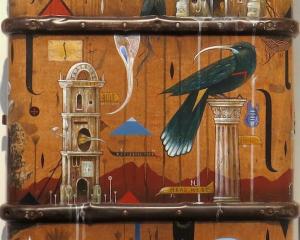Jane Austen's letters are full of witty and sometimes catty comments about her friends and acquaintances, and many of her characters behave badly, from sexual misdemeanours to social unkindness, Queens High teacher and actress Terry MacTavish says.
She and emeritus professor Jocelyn Harris, an authority on Austen, are presenting ''Women Behaving Badly'', a selection of readings from Jane Austen, at the Globe Theatre on Saturday afternoon.
Their first reading, ''Jane Austen Sampler'' a few years ago, had such a good response, they decided to do another, this time concentrating, as the title suggests, on women in her novels, and the author herself, behaving badly.
''We chose this theme partly because people have this picture of [Austen] as a rather saintly little old maid, all very cute and cosy,'' MacTavish says.
Harris explains: ''She's a Regency girl, not a Victorian girl. What happened later was she was turned into a Victorian girl''.
''Somebody said she used to sit in a room like a stiff poker not saying anything and just listening and watching. She'd be storing it all up as people made fools of themselves and behaved badly.''
It may be 200 years since her most famous novel, Pride and Prejudice, was published, but Austen has become the focus of a Janeite cult, with Jane Austen societies, conferences and events, particularly in North America where there are some 4500 members spread among 65 branches, not to mention numerous films, television series, spin-offs and memorabilia.
Prof Harris, who has recently returned from speaking at one of the conferences, says they may be like Star Trek conventions but there is a genuine appreciation of Jane Austen behind it.
''There will be 850 mostly women there who know all the novels off by heart. It's very impressive. We have a lot of fun with Jane Austen because she is very funny and there are not a lot of authors you can say that about.''
Jane Austen, (1775-1818) wrote six novels in five years, and had just been picked up by publisher John Murray and was receiving good reviews when she died, leaving Sanditon unfinished. They are romances, about the problem of finding a husband, an important task for women at the time. There were few occupations open to them besides prostitution or becoming a governess and that could be an awful life. Unmarried women ended up living with their brother or sister as an unpaid governess. It is something you have to explain to students, Prof Harris says.
Neither Jane nor her sister Cassandra married.
Jane's early relationship with Tom Lefroy, who eventually became Lord Chief Justice of Ireland, was put a stop to as neither of them had money. Later, Harris Bigg-Wither proposed to her.
''She thought about it overnight and decided to turn him down. When you think about it, she didn't particularly like him, and she wasn't that desperate. And if she had got married she would probably have had a baby every year, and might well have died in childbirth. Women writers tended not to get married or not have any children, because they couldn't really do both,'' Harris says.
Her sister Cassandra was engaged to Thomas Fowle, who died of yellow fever on his way to the West Indies where he hoped to make his fortune so they could marry. The sisters and their widowed mother finally settled in Chawton in a house on one of their brother Edward Austen Knight's estates.
People are coming to realise Austen was in touch with the wider world and her canvas was bigger than previously thought, Harris says.
She visited her brothers Francis and Charles, who were in the navy, and Henry, a London banker with a wide acquaintance, and she followed the newspapers closely.
''When you think about it, in Pride and Prejudice the militia is stationed in Meryton and that is why everything happens. They have nothing to do but swank around in their red uniforms and seduce girls and make them run mad. Lydia goes off to Brighton where there's a huge military encampment and all sorts of goings-on.
''They dress up one of the officers in a woman's dress to make him pass for a woman. I think she's making comments there, little pinpricks about the army which was considered to be much too self-indulgent and effeminate and ran away in battles.
''I think she's on the side of the navy and has a go at the army whenever she can. She talks about cross-dressing. In her juvenilia she's got some rude jokes about homosexuality and of course she'd know about sodomy. It was one of the things sailors got flogged for in the navy.''
In Mansfield Park, Mary Crawford makes a joke about it, too.
''They are talking about the navy and she says 'Don't talk to me about admirals. I've had enough of rears and vices'. And then she says something that is more or less `Did you get it? Did you get it?','' Harris says.
It is no wonder her Victorian nieces said ''we must remember Aunt Jane lived in an age that was a little more coarse than now,'' MacTavish says with a laugh.
One of Austen's most wicked characters is Lady Susan, who appears in the teenage novel of the same name. She is beautiful and bad and determined to seduce every good-looking young man. As soon as she sees her young, pretty daughter as a rival she is cruel to her, because she is determined to get the rich man for herself - and she is unchaste as well, MacTavish says.
There are other sorts of bad behaviour in her novels including the Dashwoods' in Sense and Sensibility.
''John Dashwood has promised to look after his father's second wife and half-sisters, and talking to Mrs Dashwood, brings what he is going to do for them down to virtually nothing. It's like something out of Lear, cutting away everything. It's a beautiful exercise in rationalisation,'' Harris says.
From Emma, they have selected a scene in which Emma is unkind to poor old Miss Bates, an elderly spinster.
''I identify with Emma a bit because she talks before she thinks,'' says MacTavish.
''She sees a smart opening for a funny line and she can't resist. If she just stopped and took a wee thought that she might hurt someone's feelings she wouldn't say it. But she's vain. She's enjoying her own wit and out comes the line. Even though she could bite her tongue off afterwards, it's too late.''
Although Austen rarely describes her characters in her novels, she had a sharp wit describing people in surviving letters to her sister Cassandra.
Of an acquaintance she writes ''I looked at his daughter and thought her a queer animal with a white neck. Her husband is ugly enough, uglier even than his cousin John, but doesn't look so very old. Miss Maitland is prettyish, very much like Ann with brown skin and large dark eyes and a good deal of nose. I was as civil to them as their bad breath would allow me''.
See it
Women Behaving Badly: Extracts from the works of Jane Austen, compiled and presented by Terry MacTavish and Jocelyn Harris, is at the Globe Theatre in London St on May 18 at 3pm, followed by complimentary afternoon tea. Members of the audience are invited to wear Jane Austen-inspired costumes. This event is a fund-raiser for repairing the Globe Theatre's roof.












![... we all become all of these things [installation view] (2025), by Megan Brady.](https://www.odt.co.nz/sites/default/files/styles/odt_landscape_small_related_stories/public/story/2025/03/1_we_all_become_all_of_thes.jpg?itok=nicA_yAm)